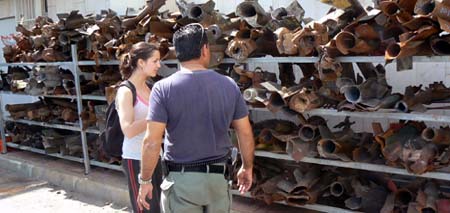 |

Courage and Determination
along Israel's Gaza Border
This website is dedicated to those individuals who live in
the Sderot, Israel, area, and are within range of the thousands
of rockets fired from Gaza in the past several years. |
This website was created in 2008 and taken offline in 2018.
Because of the recent Hamas atrocities I am putting this back online for historical purposes.
Israelis have suffered attacks from Hamas for many years.
|
People of Sderot and the Gaza Border area
Page two
|
 Barak
Barak
Sderot Police Department Bomb Squad |
Barak works with the Sderot Police Department and has multiple tasks, including bomb removal. In the photo at the left he stands with part of a Grad missile which landed in Ashkelon. The firing of this rocket showed that Hamas had increased the range of its missiles, and prompted Israel to go into Gaza in early March 2008.
Barak explained the differences between the rockets: kassams (seen in the photo below) are home-made, short range, and highly inacccurate. Half of those shot at Israel fall into Gaza, killing Gazans. The Grad and Katyusha rockets are much larger, about six feet long, and can be aimed more accurately. The Grad is a single rocket, made in a factory. Iran is the source of the Grads brought into Gaza. The Katyusha is made in a factory, but in segments, five separate pieces, and can be easily smuggled.
In the photo below, Barak is telling Dana of the different kassam rockets which have fallen in the Sderot area.
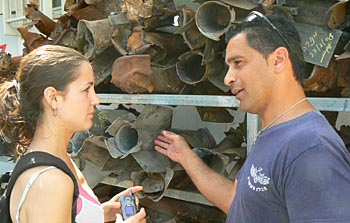
|
|
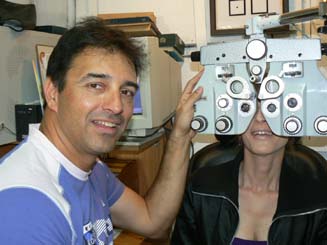
Edi
|
Edi has an M.A. in clinical optometry from the Pennsylvania College of Optometry. He lives in a moshav on the Gaza border, Netiv ha-Asara. "The fence runs through our neighborhood," he says. I ask him if being this close to the border, and therefore closer to danger than most places, might cause him to move to a safer place.
"What are the options?" he asks in return. "We have only one country. If we leave this area, they will take it and want more. Leaving here will not bring peace. It would just bring more war."
Edi speaks fluent Arabic and has "many friends in Gaza." He says he speaks to them frequently, and they too would like to live a normal life, to have jobs, and raise their families in a peaceful environment. "There will be peace one day," he says."I don't know when."
|
|
Nofar is a student at Sapir Academic College, and is from Tel Aviv. "I wanted to go to school in a rural environment," she says. "And yes, I had heard about the kassams and thought I could handle the situation."
Can she handle the situation, I ask. She thinks for awhile. "The political situation has to do with my personal life," she answers. "When I'm able to express myself, to work creatively in the film school where I study, then I can deal with the kassams. When I feel I'm not being creative, then everything is more difficult. These last few weeks have been hard. After the student was killed I was afraid to pick up my gear, I was very frustrated. For a time I was thinking about leaving."
And now, I ask her, does she still think about leaving? "No," she answers. "I don't want to leave, and I'm not going to leave. Each day I get stronger. This experience is giving me the strength to deal with any personal issues I might have."
|
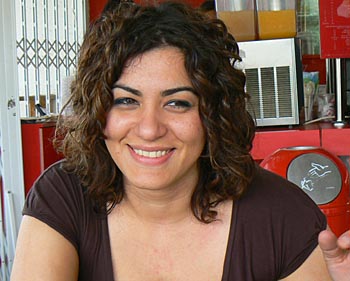
Nofar
|
|
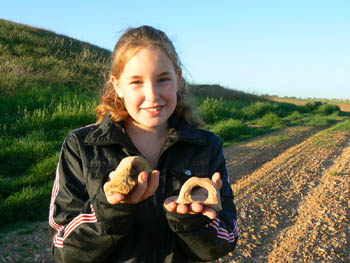 Mayan
Mayan |
"I've never known a time without bombing," says Mayan, a 13-year-old living on Kibbutz Nir-Am. "It has been all of my life, since I was five years old, and I can't remember the times before that."
Mayan is one of the thousands of kibbutz and Sderot children who have grown up within range of Hamas rockets. In addition to dealing with the normal problems of adolescence, they have been subjected to the often-deadly shelling of an enemy a short distance across the border. These children live in a world where their homes could be blown apart at in moment.
But in spite of these pressures, Mayan is growing up as a happy, confident, and outgoing child. She speaks Hebrew and English fluently, and is learning Arabic. She has a great love of animals and would probably adopt every stray dog in Israel if her parents would let her.
Mayan looks forward to the possibility of a summer camp in the States during the summer of 2008. If this happens, it will be a great distance from the place and time when a kassam missile landed ten feet from her bedroom and exploded.
|
|
Orel is a third-year student at Sapir Academic College, studying communications and digital media. He was in the education corps of Israel's army, and taught teenagers the meaning of being patriotic, as well as opportunities within Israel's Defense Forces. "I came here out of a true faith in the cause," he says. "He's a big-time Zionist," interrupts his friend Tal.
"Yes," says Orel. "In the entire time the kassams were falling here, I never left, even in the worst times. But I came here also because of the intimate atmosphere, the fact that Sderot is somewhere not developed."
Orel has explored other frontiers besides this land of the kassams. He started a group for gay youth in Sderot, a city filled with more traditional cultural groups. "It is difficult all over the country," says Orel, "but particularly difficult in Sderot."
Orel's family was a big influence on him. "I was taught at home never to give up," he says. "I grew up in Jerusalem with suicide bombers, but I was taught by my father never to be afraid." |
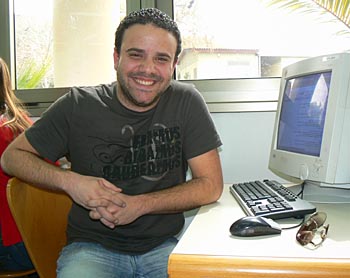 Orel
Orel |
|
|
|